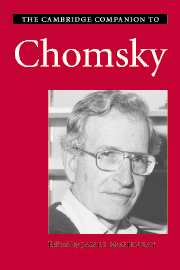Introduction
Published online by Cambridge University Press: 28 May 2007
Summary
At the time of writing, Noam Chomsky has produced over eighty books, hundreds of articles, and thousands of speeches. He has given thousands of interviews, written countless letters, and supervised scores of theses. He has made important, sometimes groundbreaking, contributions to three areas - linguistics, philosophy of mind and human nature, and politics. He set linguistics on a successful naturalistic, biologically oriented scientific course; his theoretical contributions continue to lead the field. Like Descartes, Galileo, and Hume, and unlike the eighteenth-century philosopher Kant and the great majority of philosophers thereafter, Chomsky is both scientist and philosopher, and his philosophical work is continuous with his scientific. His science of language and incipient science of mind offer a genuine prospect of coming to a biologically based grasp of human nature and of the way it allows for human understanding and action. His political work, like both Hobbes’s and Rousseau's, seeks a foundation in a science of human nature, although with better prospects for developing such a theory - and for exploring its implications for political ideals and goals - than Hobbes’s misguided attempt to construct a causal theory of human action or Rousseau’s fanciful assays into a “state of nature.” And unlike both of them - and far too many contemporary political “theorists” - there is no sign in Chomsky’s political work that his views and critical analyses are driven by a wish for power.
- Type
- Chapter
- Information
- The Cambridge Companion to Chomsky , pp. 1 - 18Publisher: Cambridge University PressPrint publication year: 2005
- 3
- Cited by



